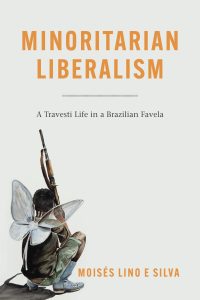Four Questions with Moisés Lino e Silva, Author of “Minoritarian Liberalism”
Minoritarian Liberalism is a mesmerizing ethnography of the largest favela in Rio, where residents articulate their own politics of freedom against the backdrop of multiple forms of oppression. We spoke with the author, Moisés Lino e Silva, to hear a little more about the inspiration for this book, some of his research experiences, and the plans for his next manuscript.
How did you become interested in researching Brazilian favelas? What led you to write about this subject?
I was born in a small town in the Brazilian Midwest. Television was our main window to the world. It happens that the largest TV channel in Brazil has its headquarters in Rio de Janeiro, and we saw a disproportionate number of images from Rio. I was always puzzled by what looked like extremes of the same city: images of the astonishing beaches, wealthy people living in skyscrapers, and green tropical mountains existing face-to-face with open-air sewers, improvised shacks, and deadly violence in the favelas.
During my college years, I started to access the anthropological literature to help me think through such inequalities. Readings on social justice, development, liberalism, and other important themes in urban studies made me even more passionate about questions related to favelas. The beauty of anthropology, however, is that it also pushes us into the world, to experience life in places where our research questions lie. Nothing quite prepared me for the situations I experienced when I moved to Favela da Rocinha, in Rio de Janeiro, as part of my doctoral research. I soon realized that the experiences of people living in favelas are rarely told from the inside. Television news broadcastings, movies, and even academic arguments often fail to understand the internal logic of life in favelas. During fieldwork, I realized that favela dwellers have developed their own theories of liberalism, for example, which are based on their specific life experiences. Furthermore, this favela knowledge on liberalism does not necessarily follow the same logic of Eurocentric ideas on liberty and freedom. I wrote Minoritarian Liberalism to present the stories and intellectual arguments I learned while living in a Brazilian slum.
While working on the book, what did you learn that surprised you the most?
When I moved to Favela da Rocinha, I had initially expected to witness and register contemporary processes of oppression using ethnographic methods. I assumed that the scarcity of freedom in the lives of the Brazilian urban poor would be an important topic for in-depth anthropological analysis. Above all, I hoped that an exposé on the lack of liberties in Brazilian favelas could help to bring change to the unfortunate situation I anticipated to encounter.
However, it only took me a couple of weeks of fieldwork to start noticing that there was no scarcity of freedoms in the favela in an absolute sense. Instead, day after day, I began to notice different expressions and practices of freedom in the slum. The problem seemed to be that most of these favela freedoms were not the same freedoms that I already knew, and those which liberal supporters cherished. Some of them were very unfamiliar to me—and probably unfamiliar to others who had never set foot in a favela. Contrary to what I had anticipated, the research process for this book allowed me to witness liberties where I least expected them to exist, and to understand their importance for those who lived by them.
What surprised me the most, however, was to realize the importance of “liberation” as part of different religious practices in the favela. Catholic, Evangelical, and Afro-Brazilian religious communities were all engaged in a fierce dispute over the practical significance of freedom in their lives. As I started to follow these threads, I experienced what would turn out to be the most serious episode of violence against me during all my time living in the favela. Bouncers of a prominent Evangelical church grabbed me by force, confiscated my fieldnotes, and kicked me out into the street during a liberation service. As I filed a police report against their use of violence, I was informed that the church in question had committed the following crime: violation of my personal freedoms. These sorts of disputes and conundrums regarding our contemporary understandings of freedoms and liberties are at the core of my book.
What do you most hope people take away from your book?
First of all, I hope readers will appreciate the effort that I put into the narrative style of the book. The many interlinked stories of freedoms and liberties in favela life are presented on equal foot with anthropological and political theories on liberalism. In other words, I aimed for a book that is pleasurable to read and does not privilege academic voices over the knowledge of my friends in Favela da Rocinha. Connected to this, I want people to feel how generous and how wonderful people in the favela have been with me and towards my research, particularly, my friend Natasha—whose life experiences inform the narrative arc for the book—and other queer folks.
Finally, on more theoretical terms, I hope to have made it clear that the concept of “minoritarian liberalism” that I introduce in the book is not meant to be simply a variation of liberalism within a pre-established framework of tolerance toward cultural “diversity.” Instead, the concept is derived from fieldwork experiences and a type of anthropology that the decolonial scholar Faye Harrison would have described as “based on conscious political choices about standing on the side of struggle and transformation.” (Harrison, Decolonizing Anthropology, 88). In this case, rather than merely looking to expand a catalog of freedoms, as some sort of anthropological “butterfly collection” exercise, I suggest that the main point of taking minoritarian liberties seriously is to further the struggle of favela dwellers against forms of domination that are not the most evident and, for that same reason, more effective. Notably, I am referring to the colonization of liberal possibilities by normative liberalism. Many people who claim to support freedom have blind spots when it comes to liberalism. The realization that minoritarian modes of liberalism exist should serve to increase the heterogeneity of liberal possibilities, not to further the universalization of a particular type of Eurocentric liberalism.
Did your research turn up anything interesting that didn’t make it into the final manuscript? Where will your research and writing take you next?
Life is always more interesting and more complex than we will ever be able to register in our research and to express in our writings. Having said that, the exercise of writing about a given topic also opens up new possibilities for a world that could be different from what it currently is. There is an episode in the book in which I describe my first encounters with “spirit possession” as part of an Afro-Brazilian ritual that was taking place at the nearest beach to the favela during my fieldwork. That night, a spiritual entity told me that I would come to know the mysteries of their religion. I waited until the end of the event and was a bit disappointed, nothing special seemed to have happened or to have been revealed to me at that moment.
Well, little I knew then that over the years my life would get profoundly enmeshed with Afro-diasporic religions, to the point that I was later initiated into Brazilian Candomblé and, soon after, into the Yoruba traditional religion of Nigeria. These initiations changed my life and brought me into close contact with contemporary Afro-Atlantic experiences. My next book project relies on ethnographic methods to rethink the political status of freedom in the aftermath of formal slavery. The stories I want to tell next are based on years of fieldwork with Nigerian and Afro-Latin American communities. I believe that furthering the decolonization of liberalism, something I propose in Minoritarian Liberalism, demands a much more critical examination of the freedoms BIPOC people have achieved so far and how these freedoms have advanced or hindered further struggles for liberation. The manuscript will explore contemporary entanglements of sexuality, racism, spirituality, and power from a transatlantic perspective, questioning contemporary understandings of liberty against a background of unrealized promises of abolition.

Moisés Lino e Silva is tenured faculty in the department of anthropology at the Federal University of Bahia (UFBA) in Brazil.
Minoritarian Liberalism is available now from our website or in early April from your favorite bookseller.
